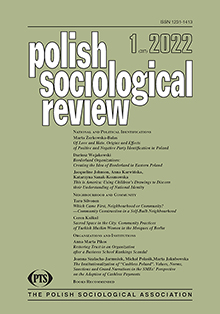Of Love and Hate. Origins and Effects
of Positive and Negative Party Identification in Poland
Of Love and Hate. Origins and Effects
of Positive and Negative Party Identification in Poland
Author(s): Marta Żerkowska-BalasSubject(s): Politics / Political Sciences, Social Sciences
Published by: Polskie Towarzystwo Socjologiczne
Keywords: turnout; electoral behavior; party identification; negative party identification; partisanship
Summary/Abstract: The nature and effects of party identification in post-communist democracies have been an object of disputes, as the existing research does not lead to conclusive results. The present paper contributes to the discussion with analyses of four-fold typology of partisans (Rose, Mishler 1998), who either have a positive or negative party identification, or both, or none. We embed this typology in a contemporary Polish context. Using the PNES data for the 2005–2019 elections, we examine the proportions of each type of partisanship and their stability in time. We also verify what their determinants are and what their influence on electoral participation is. Our results demonstrate that positive and negative party identifications are of rational origin, although since 2015, expressive partisanship is also developing. We also prove that positive, negative, and combined motivations make Poles more prone to vote, contributing to the stability of democracy on a behavioral level.
Journal: Polish Sociological Review
- Issue Year: 217/2022
- Issue No: 1
- Page Range: 3-22
- Page Count: 19
- Language: English

